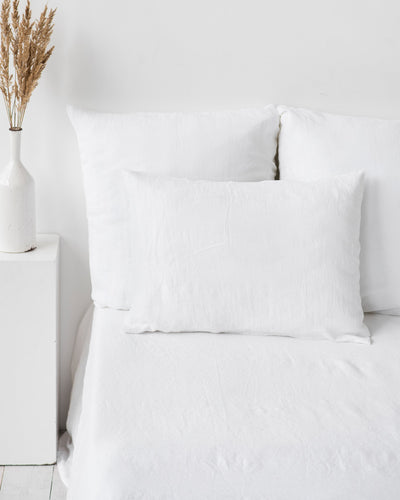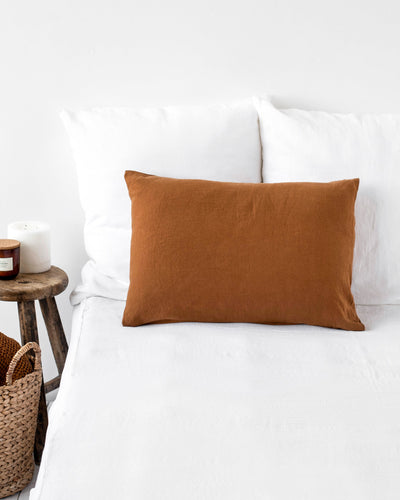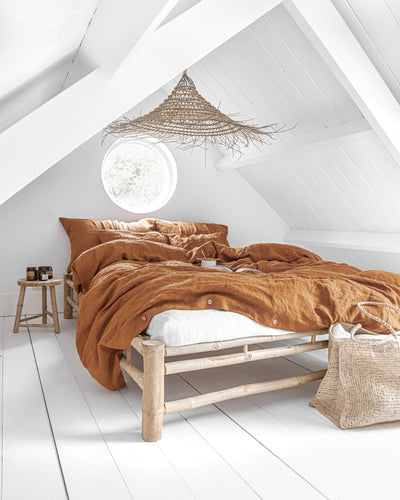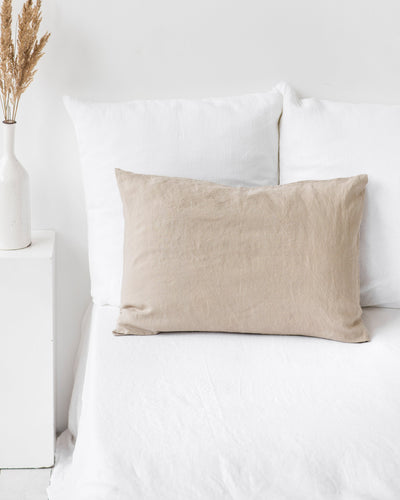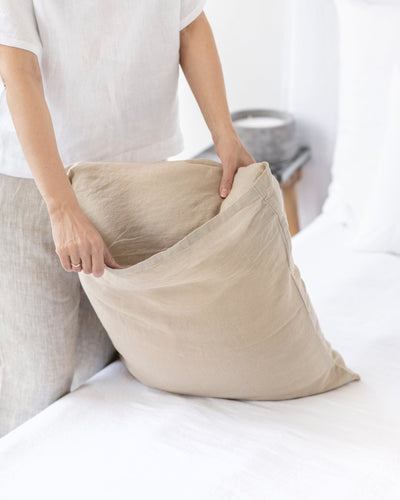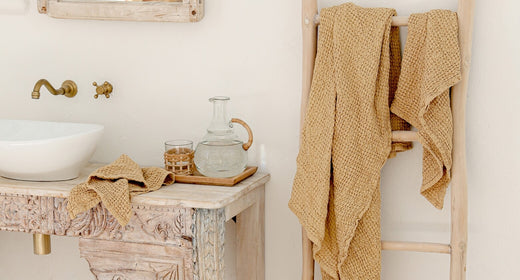The Difference Between Linen and Cotton
Welcome to a magical journey through the woven threads of two of the most beloved fabrics in the textile universe: linen and cotton. At MagicLinen, we’re not just about crafting beautiful textile pieces; we are about weaving stories, embracing authenticity, and adding a sprinkle of magic to your everyday life.
Today, we unravel the tales of linen and cotton, guiding you through their unique stories, characteristics, and the beauty they each bring into our lives. In this guide, we will explore the realms of ‘linen vs. cotton,’ helping you uncover the differences and choose the fabric that resonates most with your heart and home.
Origins and Fabric Construction
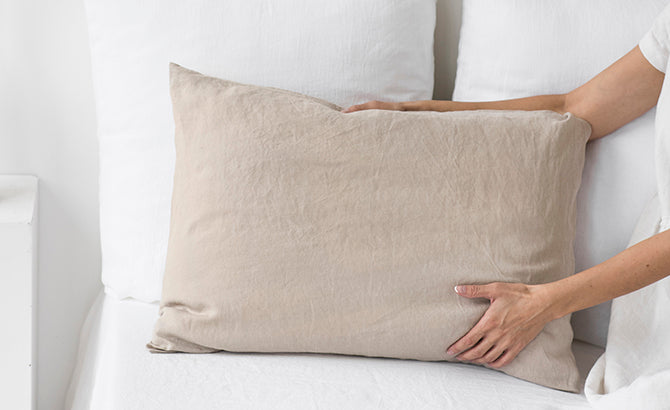
In the enchanting world of textiles, the origins and construction of fabrics tell tales of tradition, innovation, and craftsmanship. Let us voyage through time and nature, unraveling the stories woven into the heart of linen and cotton fabrics.
Linen: The time-honored textile
Linen, a luxurious and durable fabric, has whispered the songs of centuries, cradling civilizations in its soft yet strong embrace. Harvested from the flax plant, linen is a gift of nature, cultivated with care and transformed with skill. The journey of flax from plant to fabric is a meticulous craft involving retting, scutching, and hackling. Each thread holds within it a legacy of expertise as it weaves the magical realms of comfort, elegance, and resilience.
Cotton: The canvas of versatility
Cotton’s tale is woven into the fabric of diverse cultures, a ubiquitous presence known for its softness, versatility, and accessibility. Originating from the cotton plant’s fluffy fibers, this fabric carries the gentleness of nature, offering breathability and comfort. The process from fiber to fabric involves ginning, spinning, and weaving, each step a tribute to the innovation and mastery of textile crafts.
Cotton presents a canvas where simplicity meets functionality, creating spaces that resonate with ease, adaptability, and a sense of welcoming embrace. Its global presence and diverse applications speak of its universal appeal, making it a beloved choice in the vast universe of textiles.
Linen vs. cotton: Weaving differences
In the loom of comparison, linen and cotton emerge as distinct tapestries of experience and expression. Linen, with its natural luster and textured grace, speaks the language of luxury and longevity. Cotton, soft and inviting, narrates stories of gentle comfort and versatile charm. Their construction tells tales of nature’s brilliance, human ingenuity, and the timeless allure of quality fabrics.
Texture and Feel

In the tactile world of textiles, the texture and feel of fabrics play pivotal roles in their allure and functionality. They whisper the unspoken words, create moods, and embrace us in layers of comfort and style. As we dive deeper into the realms of linen and cotton, let’s explore the sensory symphonies these fabrics compose, touching souls and spaces with their unique vibrancy.
Linen: A symphony of strength and softness
Linen, with its naturally textured surface, carries a rustic elegance and a delightful touch of the extraordinary. It gracefully marries strength with softness, creating fabrics that are as durable as they are comfortable. Over time, linen reveals its magical ability to become softer with each wash, inviting a timeless charm and evolving adaptability. Its weave, though open and breathable, carries a weight and drape that effortlessly cascades, embodying a richness that enhances the aesthetics of spaces and wardrobes.
Cotton: A canvas of comfort and versatility
Cotton enters the sensory stage with a universal appeal, characterized by its softness, smoothness, and welcoming embrace. Its texture, gentle against the skin, makes it a cherished choice for fabrics that seek to deliver comfort, breathability, and a touch of homely warmth. Cotton’s versatile nature allows it to adapt, offering various weaves and finishes that range from the sumptuously soft to the delightfully crisp, accommodating a spectrum of preferences and uses.
In its adaptability, cotton becomes a canvas where the simplicity of comfort meets the diversity of expressions, cultivating environments and pieces that resonate with ease, accessibility, and a tender touch.
Linen vs. cotton: A tactile exploration
Comparing linen and cotton reveals a spectrum of textures and feels, each bringing its unique energy and essence to the tactile experience. While linen enchants with its textured resilience and evolving softness, cotton soothes with its gentle, versatile embrace. The choice between them unfolds as a journey through personal preferences, desired atmospheres, and the special kind of comfort and expression you wish to cultivate.
Durability and Longevity
Embarking further into the journey of unraveling the mysteries of linen and cotton, we now step into the realms of durability and longevity. Both of these fabrics bring to the fore a wonderful combination of aesthetic grace and functional strength. They carry tales of time, wear, and the gentle passage of seasons, inviting us to explore their staying power and the lasting beauty they impart to our lives and spaces.
Linen: The epitome of resilience

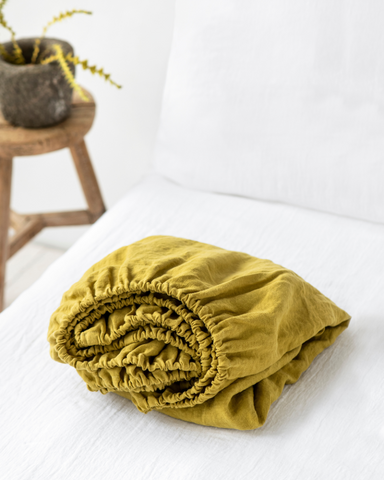
Linen, historically revered for its remarkable durability, stands as a testament to the timelessness of natural fibers. It is incredibly resilient, capable of withstanding the rigors of repeated washing and wear, often surpassing cotton in its ability to endure. Interestingly, linen fibers are known to become even more beautiful and softer over time, embracing a patina of age that enriches its character and appeal.
Cotton: A journey of reliable comfort
Cotton, on the other hand, brings a comforting reliability, offering a fabric that maintains its gentle touch and appearance through time. While it may not boast the extraordinary longevity of linen, cotton still holds its own with a commendable durability, especially when cared for with attention and love. Cotton’s universal presence in everyday textiles speaks of its trustworthiness and the steady comfort it provides across various uses and expressions.
Linen vs. cotton: Durability and longevity
When weighing linen against cotton in the scales of durability and longevity, each tells a story of resistance, wear, and the passage of time. Linen leads with exceptional resilience and an aging grace, while cotton presents a tale of reliable and consistent performance. The narratives of both fabrics allow us to explore and appreciate the varying degrees of lasting beauty and practical endurance they can bring into our lives and homes.
Care and Maintenance
In the garden of textiles, care and maintenance are the water and sunlight that nurture the fabrics, allowing them to blossom over time. It is through these practices that the true essence of materials like linen and cotton can flourish, maintaining their beauty, functionality, and charm throughout their lifecycle.
Linen: Graceful aging with gentle care
Linen carries within its fibers the beauty of endurance, but like any natural element, it thrives best with thoughtful care. Washing linen with gentle cycles and mild detergents helps maintain its structural integrity and natural luster.
Allowing linen to air dry preserves its fibers, allowing the material to breathe and maintain its luxurious feel. Ironing is optional based on personal aesthetic preferences, but a slightly wrinkled appearance is part of linen’s unique charm, often celebrated for its relaxed elegance.
Cotton: Preserving softness with consistent care
Cotton, being versatile and sturdy, allows for easy care routines. It generally responds well to machine washing and can handle warmer temperatures without significant damage. However, to maintain its softness and color vibrancy, it's advisable to wash cotton items in cold water and avoid excessive bleaching. Tumble drying on a low setting or air drying helps preserve the fabric’s soft texture and overall integrity.
Linen vs. cotton: nurturing textile well-being
In the narrative of care and maintenance, both linen and cotton unveil chapters of simplicity and mindfulness. Linen asks for a gentle touch, allowing its natural elegance and durability to shine, while cotton offers flexibility, maintaining its comfort with regular and straightforward care routines.
Sustainability and Environmental Impact
In an era where the earth’s well-being is intertwined with our choices, the sustainability and environmental impact of fabrics become chapters of immense significance in our textile tales. Linen and cotton, each with their unique narratives, contribute to this dialogue with their ecological footprints and sustainable stories.
Linen: A friend of nature


Linen, in its essence, is a testament to sustainable elegance. Cultivated from the flax plant, it requires considerably less water and pesticides compared to other crops, making it a more environmentally friendly option.
The entirety of the flax plant can be used in various applications, ensuring minimal waste and maximizing utilization. Linen’s longevity also contributes to its sustainability, as its durable nature allows it to withstand the test of time, reducing the need for frequent replacements.
Cotton: A diverse spectrum of sustainability
Cotton, a beloved global fabric, presents a diverse spectrum in terms of sustainability. Traditional cotton cultivation practices often require significant water usage and chemical inputs. However, the emergence of organic cotton and advancements in sustainable farming practices have paved the way for a more eco-friendly cotton narrative.
Organic cotton emphasizes reducing chemical usage, promoting healthier soils, and encouraging biodiversity, marking a positive shift towards environmental mindfulness.
Linen vs. cotton: Sustainability
Comparing linen and cotton unveils varied landscapes of sustainability. Linen naturally embodies a spirit of eco-friendliness, while cotton’s journey towards sustainability is evolving with innovation and mindful practices. Both fabrics, in their unique ways, participate in the broader dialogue of environmental impact, inviting us to consider our choices through the lens of the earth’s well-being.
Style and Aesthetic Appeal
Let’s delve into the realms of style and aesthetics where linen and cotton paint the canvas of our homes and wardrobes with their unique textures and designs.
Linen: Elegance in simplicity
Linen effortlessly exudes an elegant vibe with its natural, slightly rumpled look, making it a perfect match for a laid-back yet stylish setting. It embodies a blend of tradition and modernity, offering a casual, chic appeal that can enhance the ambiance of spaces and clothing styles. Linen, inherently textured and richly tactile, embraces a straightforward elegance that connects us with the natural world, enhancing the sense of comfort and luxury in our living spaces.
Cotton: Smooth and versatile
Cotton stands as a testament to versatility and universal appeal. Its smooth surfaces and adaptability allow it to complement various styles, from traditional to contemporary. Cotton fabrics offer a wide array of colors and prints, catering to different preferences, moods, and decorative themes. Its consistent texture provides a neat, polished look, making it a go-to fabric for a clean and well-organized appearance in both fashion and home décor.
Linen vs. cotton: Tailoring your style
When choosing between linen and cotton, it’s like picking between two distinct styles. Linen brings a relaxed, effortlessly classy appearance, championing a connection with natural, simplistic beauty. Cotton, versatile and polished, seamlessly fits into diverse styles and settings, ensuring comfort and a universally pleasing aesthetic.
Cost Considerations
Budget often plays a crucial role in decision-making. Let’s talk numbers and understand the cost dynamics of choosing between linen and cotton.
Linen: A luxurious investment
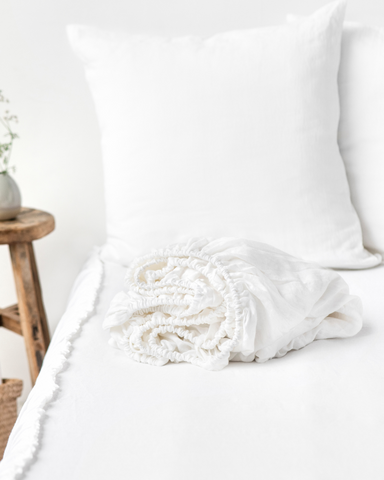
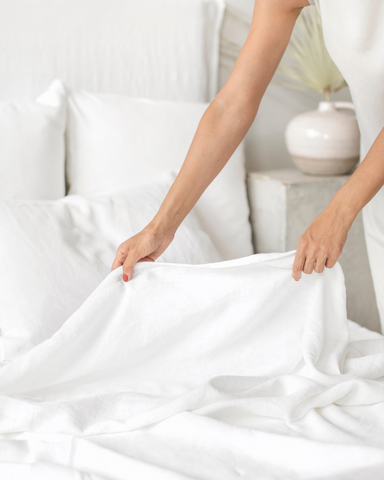
Linen tends to be pricier, positioning itself as a luxury fabric. The cost reflects its labor-intensive production process and the high-quality output. It's a long-term investment, with linen items often outlasting their cotton counterparts. Their enduring beauty and functionality can justify the initial expense, offering value over time.
Cotton: Affordable and accessible
Cotton is generally more wallet-friendly, making it a common choice for various textile needs. Its widespread availability and diverse range allow for a variety of options catering to different budget constraints. While it might not have the longevity of linen, cotton offers immediate comfort and style at a more accessible price point.
Linen vs. cotton: Weighing the costs
In weighing cost considerations, it boils down to personal priorities. If upfront cost is a significant factor, cotton might be the way to go. For those looking at it as a long-term investment, valuing durability and a luxurious feel, linen could be worth the extra expense.
Final Thoughts: Linen vs. Cotton
In the symphony of fabrics, linen and cotton each play a unique melody. However, linen seems to conduct a more enchanting orchestra of qualities that might captivate your senses a bit more profoundly. With its exquisite embrace of luxury, durability, and a deep connection to nature’s elegance, linen invites you into a realm of timeless beauty and exceptional quality.
Cotton, with its soft, versatile charm, holds a familiar, comforting presence. Yet, when it comes to making a choice that sings of long-term investment, environmental kindness, and a dash of effortless sophistication, linen seems to compose the more compelling symphony.
In choosing linen, you’re not just selecting a fabric, but engaging with a tradition of luxury and the promise of a fabric that matures gracefully with time, enhancing your space with an enduring charm. So, may your choice resonate with your aspirations for quality, beauty, and a touch of life’s finer melodies.
Why stop at just knowledge? It's time to experience the difference firsthand! Check out our linen bedding, clothing, loungewear, curtains, and more!
 United States
United States
